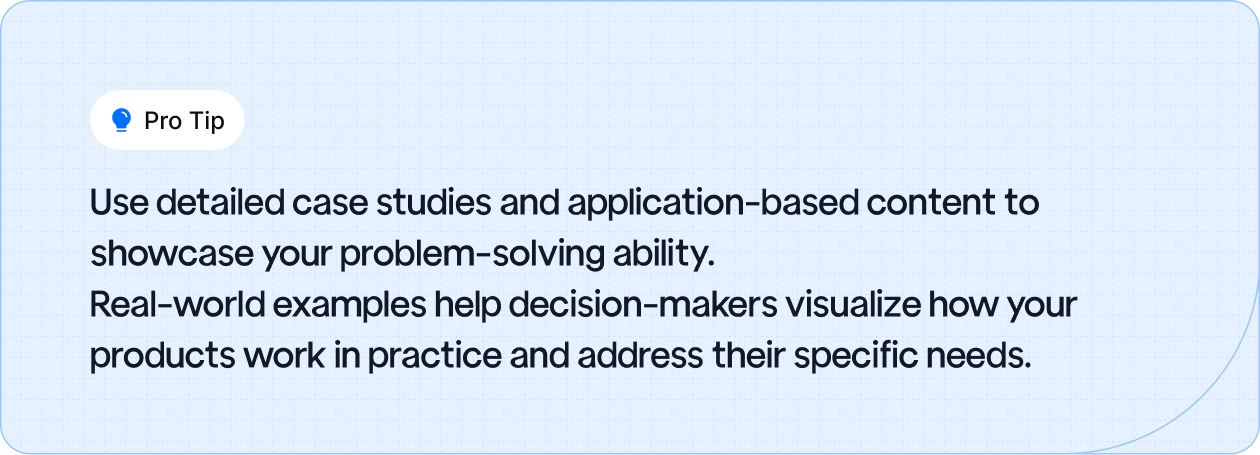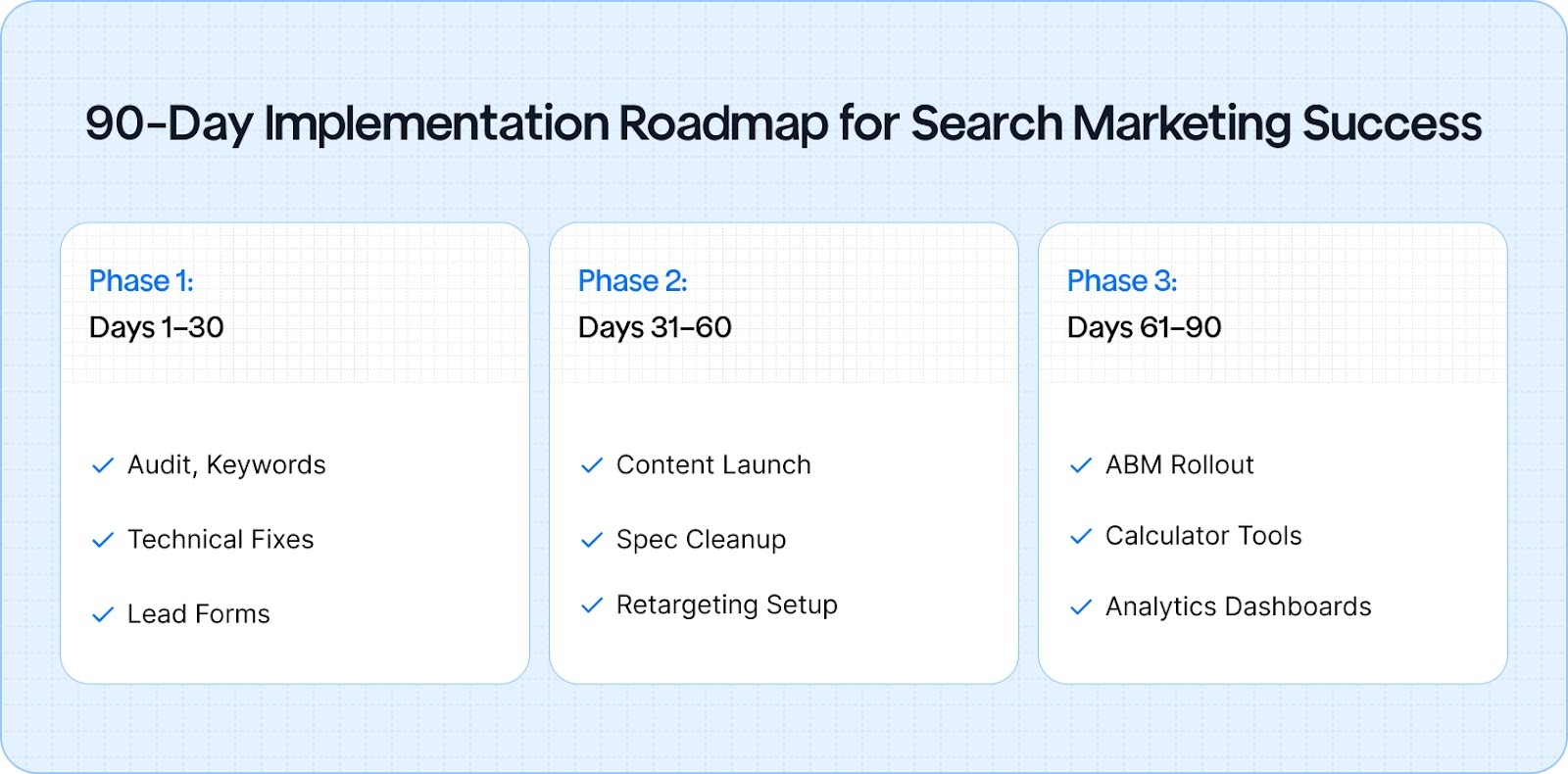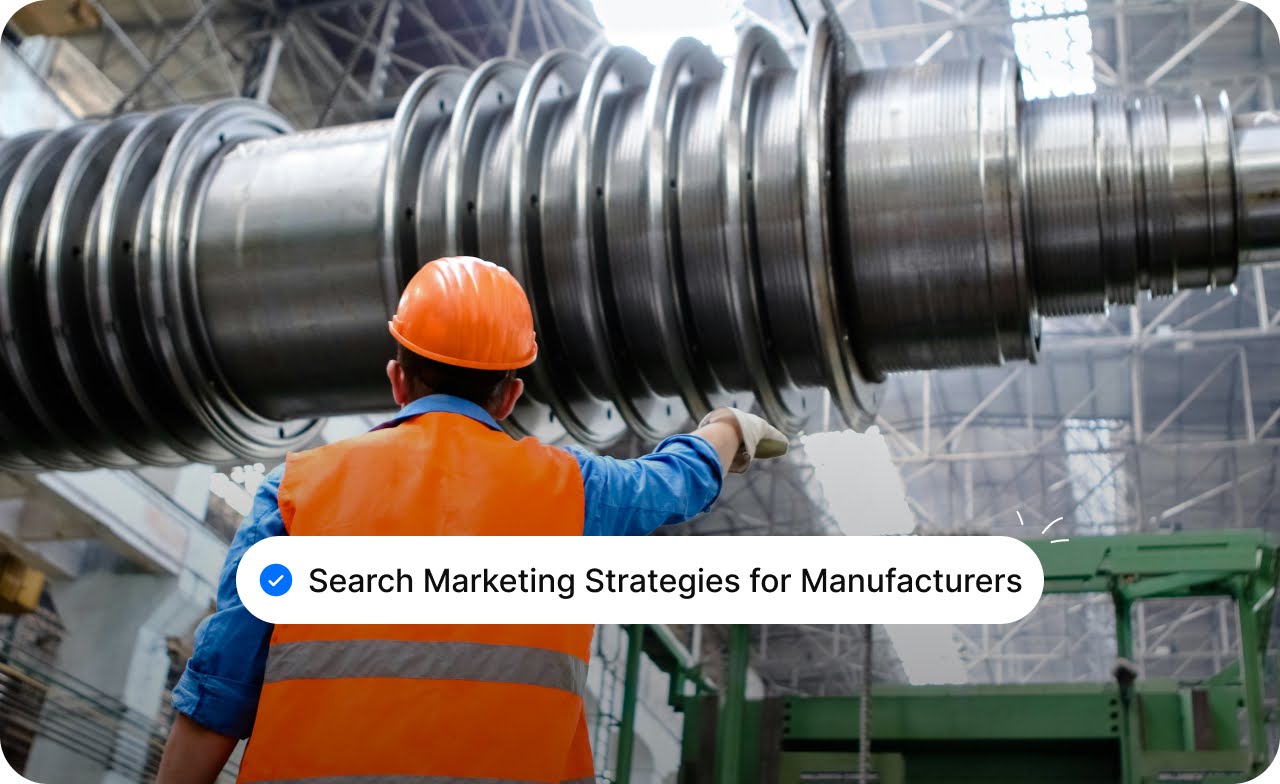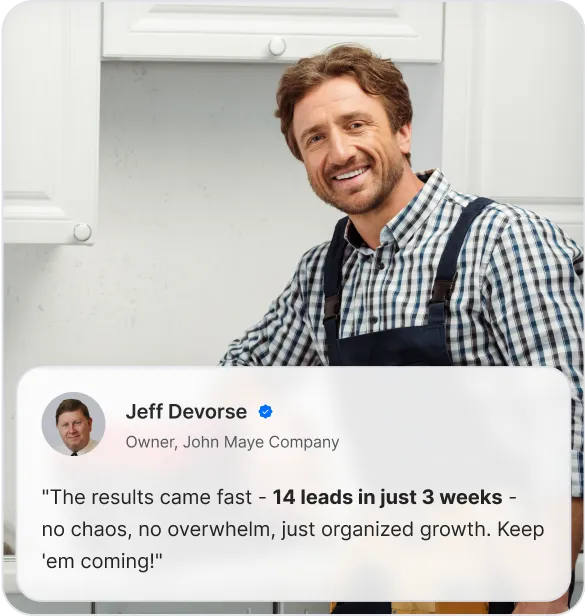Manufacturers are wasting valuable resources on search marketing campaigns (strategies that drive traffic through paid ads and organic search results) that attract leads who don’t understand the complexities of your products or aren’t ready to buy.

Despite investing in SEO and PPC, the quality of leads often doesn’t justify the effort, leaving engineers, procurement teams, and plant managers overwhelmed with irrelevant inquiries.
The real challenge is attracting the right traffic.
This guide helps you target decision-makers who will understand your product's technical details and convert into loyal customers.
Why Manufacturer Search Differs from Other Industries?
Manufacturers face unique challenges when it comes to search marketing.
Unlike consumer-facing industries, where people typically make quick, emotional decisions, manufacturing buyers, including engineers, procurement managers, and plant supervisors, have specific, technical needs that demand detailed information..
They search with a clear purpose: to find solutions that meet precise specifications, ensure compliance, and match complex project requirements.
This search behavior significantly impacts how manufacturers should approach their digital marketing strategies.

Here’s how search behavior differs across industries:
Keyword Strategy That Converts Technical Buyers
To effectively reach technical buyers, your keyword strategy must go beyond broad terms. It needs to align with the detailed, problem-solving searches that engineers, procurement managers, and decision-makers use.
These buyers are looking for very specific information, part numbers, technical specifications, and compliance standards.
Here’s how you can build a keyword strategy that matches their search intent and drives qualified leads. Key areas to focus on:
1. Part Numbers and SKUs
Buyers often search using specific part numbers or SKUs, especially when they already know what they need. Optimizing for these terms ensures your products show up in the right searches.
2. Industry Standards and Compliance Terms
Compliance is critical in manufacturing. Ensure your content is optimized for industry standards (e.g., ISO, ASTM) and compliance-related terms to capture buyers looking for certified, compliant products.
3. Process, Material, Tolerance, and Finish-Based Searches
Technical buyers often search for products based on specific processes (e.g., injection molding), materials (e.g., aluminum), tolerances, or finishes. Make sure your product pages include these technical details.
4. Application and Industry-Specific Keywords
Each industry has its own language. Automotive, aerospace, and construction industries all require application-specific keywords that resonate with your audience’s needs (e.g., "automotive CNC machining" or "medical-grade plastic molding").
Building Content That Engineers Actually Read
Creating content for engineers, procurement managers, and other technical decision-makers requires a clear, focused approach. These buyers don’t want oversimplified content; they need in-depth, technical information that addresses their specific challenges and concerns.
To capture their attention and drive conversions, your content must demonstrate technical expertise while being easily accessible and practical.
Here’s how to build content that resonates with this audience. Content pillars you should focus on:
- Technical Specifications and CAD Hubs
Engineers often search for detailed product specifications or CAD files. Creating a centralized hub for downloadable specs and CAD files ensures you’re providing the technical data they need to make decisions.
- Process Deep-Dives, QA Stories, and Failure Mode Analyses
Go beyond product features and explain the processes that make your solutions work. Provide quality assurance stories or discuss potential failure modes to show how your products address real-world challenges.
- Compliance Explainers for ISO, ASTM, and Other Standards
Compliance is crucial in many industries. Content that explains how your products meet industry standards (e.g., ISO, ASTM) builds trust with decision-makers who prioritize regulatory adherence.
- Engineering Calculators, Configurators, and Demo Videos
Offer tools that engineers can interact with, like calculators for custom specs or configurators that help them tailor products to their needs. Demonstration videos showing the real-world applications of your products are invaluable.
- Case Studies with Measurable Proof and Real-World Applications
Engineers value data-driven content. Case studies showcasing how your solutions have solved real problems for other clients, with clear metrics and outcomes, validate your expertise and reinforce your brand’s credibility.
Also Read: 25+ Proven Strategies to Transform Your Industrial Content Marketing

Mastering Technical SEO for Industrial Websites
Technical SEO is crucial for ensuring that your website's detailed content, like CAD files, technical PDFs, and product specs, gets discovered by search engines.
Manufacturers often overlook key technical aspects that can make a significant difference in search visibility.
Technical SEO Checklist:
- PDF Optimization (Titles, Metadata, Compression): Ensure PDFs are optimized with clear titles, relevant metadata, and fast loading times.
- CAD File Indexing and Canonical Tags: Index CAD files and use canonical tags to avoid duplicate content issues.
- Faceted Navigation Rules for Processes and Materials: Optimize faceted navigation to make product details easy to find without crawling issues.
- Product Schema and Breadcrumb Structure: Implement product schema and breadcrumbs to improve search engine understanding and site navigation.
- Site Speed, Image Compression, and Mobile Optimization: Compress images, improve site speed, and ensure mobile optimization for a better user experience.
Must Read: 113 Distributors, Contractors & Architects Found Paniflex, Without a New Sales Hire
PPC Strategies That Drive Qualified Leads
To succeed with PPC in manufacturing, campaigns must target the right decision-makers like engineers and procurement managers.
Here’s how to create campaigns that attract high-quality leads. Key PPC strategies for manufacturers:
1. Building PPC Campaigns Based on Intent
Focus your campaigns on high-intent keywords, such as specific part numbers or industry certifications. These terms are used by buyers who are already familiar with what they need and are closer to making a purchase decision.
2. Negative Keyword Strategy to Filter Consumer Traffic
Use negative keywords to prevent your ads from showing up in irrelevant searches. For example, exclude terms like "cheap" or "free" to avoid wasting ad spend on consumers who aren’t looking to buy high-value industrial products.
3. Creating Ad Copy with Certifications, Lead Times, and Capabilities
Tailor your ad copy to highlight what matters most to technical buyers, certifications (e.g., ISO), lead times, and product capabilities.
These factors are often deal-breakers for engineers and procurement teams, so make sure your ads emphasize them.
4. Linking PPC Data to CRM and Quoting Workflows
Connect your PPC campaigns with your CRM and quoting workflows to track the performance of each lead.
By measuring the journey from ad click to quote request, you can optimize your campaigns for higher-quality leads and better ROI.
5. Measuring Profitability Rather Than Clicks
It’s important to measure lead quality and profitability. Look at how well your PPC leads convert into actual sales and factor in your product margins to determine the real value of each lead.

This will help you measure the true return on your PPC investment.
Improving Conversion Rates with User-Friendly Forms
Optimizing lead capture forms is key to improving conversion rates in manufacturing. By making forms intuitive and mobile-friendly, you ensure that prospects can easily submit the information needed to generate accurate quotes.
Using AI-based prequalification tools can also help streamline the process, ensuring that only qualified leads reach your sales team.
Key strategies to improve conversion rates:
- Mobile-Friendly Lead Forms: Ensure your lead forms are optimized for mobile devices, making it easy for decision-makers to submit inquiries on the go.
- Enabling File Uploads (CAD, BOM) for Accurate Quoting: Allow prospects to upload technical documents like CAD files and BOMs directly through the form. This ensures accurate quoting and saves time during follow-up.
- Creating SLA-Based Follow-Up Workflows: Set clear Service Level Agreements (SLAs) for follow-up responses. Automated workflows ensure leads are contacted quickly, improving your chances of conversion.
- Using AI and Chatbots for Prequalification: Implement AI and chatbots to automatically qualify leads based on their responses, ensuring that only serious inquiries are passed on to the sales team.

Account-Based Marketing for Engineering and Procurement Teams
Account-Based Marketing (ABM) is an effective strategy for targeting specific buyer committees in the manufacturing industry.
By focusing your efforts on high-value accounts and using personalized outreach, you can build stronger relationships with engineers, procurement managers, and decision-makers.
This approach combines SEO and remarketing tactics to keep your brand top of mind and increase the likelihood of conversions.
- Identifying High-Value Accounts and Targeting Engineers, Buyers, and Procurement Managers
Focus on the companies and roles that are most likely to convert. Identify your high-value target accounts, then zero in on the decision-makers within those organizations.
- Using LinkedIn and Industry-Specific Databases for Targeting
Leverage LinkedIn’s advanced targeting features and databases like ThomasNet to reach the right people. These platforms allow you to directly connect with engineers and procurement teams within your ideal accounts.
- Crafting Ads for Thought Leadership and Technical Content
Create ads that promote your expertise. Share industry insights, whitepapers, and technical content that position your brand as a trusted leader in your field.
- Creating Personalized Content Sequences for ABM Outreach
Develop tailored content sequences for each account. Use targeted emails, case studies, and product demos to engage prospects and guide them through the decision-making process.
90-Day Implementation Roadmap for Search Marketing Success

A successful search marketing strategy for manufacturers requires a clear plan and focused execution.
This 90-day roadmap will guide you through three actionable phases to optimize your online presence, attract qualified leads, and drive sales.
Phase 1 (Days 1–30): Audit, Keyword Mapping, Technical Fixes, Lead Form Optimization
- Audit your website to identify technical issues that could be hindering performance.
- Map your keywords to ensure they align with your target audience’s needs and pain points.
- Optimize lead capture forms to make them mobile-friendly and easy to use, ensuring a smooth conversion process.
Phase 2 (Days 31–60): Content Launch, Spec Cleanup, Retargeting Setup
- Launch valuable content such as blogs, case studies, and whitepapers targeting specific pain points and industry terms.
- Clean up technical specs to ensure they are SEO-friendly and easily discoverable.
- Set up retargeting ads to re-engage website visitors and drive them back to your site.
Phase 3 (Days 61–90): ABM Rollout, Calculator Tools, Analytics Dashboards
- Implement an ABM strategy targeting high-value accounts and key decision-makers.
- Launch engineering calculators or interactive tools that add value and improve engagement.
- Set up analytics dashboards to track progress and measure ROI.
Ready to Supercharge Your Manufacturing Marketing Strategy?
Manufacturers face unique challenges in search marketing, targeting the right decision-makers and driving quality leads that convert.
It's clear that a one-size-fits-all approach isn’t enough to achieve meaningful results. To truly optimize your search marketing, you need a tailored solution that streamlines your processes and boosts your ROI.
Key Takeaways:
- Targeted search strategies and technical content are key to attracting qualified leads.
- Implementing an efficient workflow for lead capture and follow-up is essential for conversions.
- Tracking and optimizing every step of your search marketing process drives success.
FAQs
Q1: How can manufacturers improve their search engine rankings?
A1: Manufacturers can enhance their search engine rankings by implementing robust Search Engine Optimization (SEO) strategies. This includes optimizing website content with relevant keywords, ensuring mobile-friendliness, improving site speed, and obtaining quality backlinks.
Additionally, creating detailed product specifications and case studies can attract technical buyers and improve organic visibility.
Q2: What is the difference between SEO and PPC for manufacturers?
A2: SEO (Search Engine Optimization) focuses on optimizing your website to rank higher in organic (non-paid) search results, which builds long-term visibility. PPC (Pay-Per-Click) advertising, such as Google Ads, involves paying for ad placements in search results, providing immediate visibility.
Manufacturers often use a combination of both to balance short-term lead generation with long-term organic growth.
Q3: How do I target engineers and procurement managers online?
A3: To effectively reach engineers and procurement managers, manufacturers should focus on creating content that addresses their specific needs and challenges. This includes publishing technical blogs, whitepapers, and case studies that highlight product specifications and industry compliance.
Utilizing LinkedIn for targeted advertising and participating in industry-specific forums can also help in reaching these decision-makers.
Q4: What are the best platforms for B2B advertising in manufacturing?
A4: For B2B advertising in manufacturing, platforms like LinkedIn and Google Ads are highly effective. LinkedIn allows for precise targeting based on job titles and industries, making it ideal for reaching professionals such as engineers and procurement managers.
Google Ads can capture intent-driven searches, directing potential leads to your website.
Q5: How can I measure the ROI of my digital marketing efforts?
A5: Measuring the return on investment (ROI) of digital marketing efforts involves tracking key performance indicators (KPIs) such as website traffic, lead conversions, and sales attributed to marketing activities.
Tools like Google Analytics and CRM systems can help in monitoring these metrics. It's important to align marketing goals with business objectives to accurately assess ROI.
Q6: What role does content marketing play in manufacturing marketing?
A6: Content marketing plays a crucial role in manufacturing marketing by educating potential customers and establishing authority in the industry.
Creating valuable content, such as technical guides, product demonstrations, and customer testimonials, can attract and engage your target audience. This approach aids in SEO and builds trust with potential clients.
Q7: Should I consider hiring a digital marketing agency for my manufacturing business?
A7: Hiring a digital marketing agency can be beneficial for manufacturing businesses, especially if internal resources are limited. An experienced agency can provide expertise in SEO, PPC, content creation, and analytics, helping to develop and execute a comprehensive digital marketing strategy tailored to your business needs.





















.webp)








.webp)
.svg)


.svg)
.svg)
.svg)




.svg)




.svg)